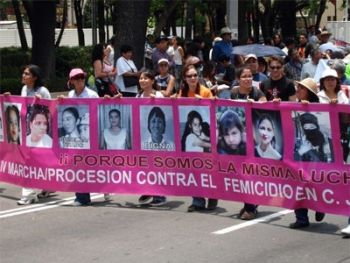
Publisher:
Bonnie King
CONTACT:
Newsroom@Salem-news.com
Advertising:
Adsales@Salem-news.com

~Truth~
~Justice~
~Peace~
TJP
Mar-07-2011 18:43

 TweetFollow @OregonNews
TweetFollow @OregonNews
The Silencing of Women' Voices
Salem-News.comIn recent years, a third variant of violence, connected to organized crime disputes, has added an “extra” deadly element to an already violent scene.
 Image from previous march: hispanicallyspeakingnews.com |
(CIUDAD, Juarez) - On the second Tuesday in March; International Women’s Day 2011, the voices of many prominent human rights defenders will be absent from Ciudad Juarez, Mexico.
Within the past 14 months, human rights campaigner Josefina Reyes, poet Susana Chavez and activist mother Marisela Escobedo all have been murdered, while Cipriana Jurado of the Worker Solidarity and Research Center and Paula Flores have been forced to flee the city.
Eva Arce, another well-known women’s activist, has been the target of previous attacks and threats, and Malu Garcia, a founder of the anti-femicide organization May Our Daughters Return Home, had her house set on fire last month.
Paula Flores, whose young daughter Sagrario Gonzalez was abducted and murdered in 1998, not only was a strong advocate for relatives of femicide victims, but a community organizer who worked to keep young people out of the cycle of crime and violence in the low-income Lomas de Poleo section of the border city.
“The murders of human rights activists show that public space can’t be used,” asserted Dr. Julia Monarrez Fragoso, researcher and director of El Colegio de la Frontera Norte (COLEF) in Ciudad Juarez. “You can’t raise your voice and those that do are ‘deserving’ of their deaths.”
Additionally, activists’ relatives have become targets, with vivid examples being the February killings of Elias and Magdalena Reyes, the brother and sister of Josefina Reyes, along with Elias’ wife Luisa Cornelas.
Interviewed on a Mexico City radio station last week, Marisela Reyes said a new threat received by her slain sister Magdalena’s son was the final straw, prompting the family to decide political asylum abroad was its only realistic option.
As a first step in the asylum process, more than 20 surviving members of the family then flew to Mexico City this past weekend. Prior to the mass departure, some Ciudad Juarez news sites published photos of the hotel where the family was staying under police protection. Other stories later reported on an unusual demonstration of unnamed persons accusing Reyes family members of besmirching the reputation of local law enforcement; some anonymous comments published on the Internet accused the Reyes clan of links with organized crime.
In a press release, the Mexican federal attorney general’s office (PGR) said national authorities were collaborating with Chihuahua state law enforcement in investigating last month’s murders of Reyes family members. The PGR said all motives for the slayings were under consideration.
On Saturday, March 5, the Reyes family and their supporters ended a nearly month-old protest encampment outside the Chihuahua state prosecutor’s offices in Ciudad Juarez.
Accompanied by Olga Reyes, several dozen activists then staged a demonstration outside the US Consulate against violence, militarization and US arms trafficking to Mexico. Reyes said the protest was necessary because “people in many parts of Mexico and in other countries don’t know what’s happening in Chihuahua.”
During the demonstration she wore a sash that read: “I am a Reyes Salazar and don’t want another member of my family murdered.” In total, six members of the family have been victims of homicide since 2008.
A spreading climate of terror was separately confirmed by Mexico’s National Human Rights Commission, which requested state protection March 6 for relatives of victims of 2009 Villas de Salvarcar massacre of young people in Ciudad Juarez. The government human rights agency said protective measures were necessary to guarantee the safety and physical integrity of the families.
On a closely related note, the Las Cruces-based solidarity group Amigos de las Mujeres (Friends of Women) expressed grave concern about the “rash of assassinations and attacks on activists who are demanding justice” carried out by “unknown paramilitary organizations, and called attention to a “disturbing pattern” in which entire families begin to receive threats that even escalate into more murders.
In a statement, Amigos de las Mujeres also sharply criticized the US federal government for its treatment of surviving members of Marisela Escobedo’s family. A Ciudad Juarez mother who tirelessly protested the murder of her daughter, Escobedo was gunned down in front of state government offices in Chihuahua City last December. Shortly afterward, her husband’s business was torched and her brother-in-law murdered.
Family members then sought refuge in the United States, but Marisela’s son Juan Manuel Frayre Escobedo and brother Hector Escobedo Ortiz remain locked up in an Otero County, New Mexico, immigration detention center.
The facility, Amigos de las Mujeres noted, was the subject of a recent report from the American Civil Liberties Union that documented a host of abuses. The group urged its sympathizers to contact their Congressional representatives and lobby for the release of Marisela Escobedo’s relatives from the immigration prison.
For nearly a decade, Amigos de las Mujeres has worked in support of relatives of femicide victims in Ciudad Juarez and Chihuahua. And like many advocates on both sides the border, group members have observed violence against women and their advocates in Ciudad Juarez and Chihuahua spiral upward with no let-up in sight.
According to a new report from COLEF, at least 1,192 women have been murdered in Ciudad Juarez since 1993, with 442 of the homicides occurring in the 12-year period from 1993 to 2005 when the city become known internationally for the crimes committed against women. Of the earlier victims, 58 remain unidentified, according to Dr. Julia Monarrez.
The lead researcher in the study, Monarrez has identified two main types of gender violence in the city: domestic and marital violence, and a second one marked by the serial murders of young, low-income women who are kidnapped, tortured and mutilated by groups of “powerful men.”
In recent years, a third variant of violence, connected to organized crime disputes, has added an “extra” deadly element to an already violent scene, Monarrez told the Mexican press in a recent interview.
In one of the latest instances of criminal violence, an unidentified young woman was shot to death firing squad-style along with four men in the Barrio Alto neighborhood of Ciudad Juarez early on the morning of March 6. Witnesses quoted in the local press described the victim unsuccessfully begging for her life. On the same day, another woman was found possibly beaten to death in the city’s conflict-ridden downtown zone.
The violence in Ciudad Juarez will receive heightened international scrutiny this week, when members of the non-governmental Ciudad Juarez Women’s Roundtable give talks in Germany, Belgium and Switzerland. The European tour is part of a new campaign to protest the “simulation of the Mexican state” in addressing gender violence, as well the Calderon administration’s failure to fully comply with the 2009 Inter-American Court of Human Rights sentence related to the murders of three young women in Ciudad Juarez back in 2001.
Andrea Medina Rosas, Women’s Roundtable spokesperson, said hundreds of national and international recommendations concerning gender violence have been made to the Mexican government during the last two decades, including some of which have been attended, but that “effective results” have been lacking until now.
Additional sources:
- El Diario de Juarez, March 6 and 7, 2011. Articles by Daniel Dominguez and editorial staff.
- Lapolaka.com, March 5, 6 and 7, 2011.
- Arrobajuarez.com, March 5 and 6, 2011.
- La Jornada, March 5, 2011. Articles by Ruben Villalpando and Ariane Diaz.
- Cimacnoticias.com, March 4, 2011. Articles by Gladis Torres Ruiz. El Paso Times, February 18, 2011. Article by Diana Washington Valdez.
- Frontera NorteSur is made possible by reader contributions and a grant from the McCune Charitable Foundation.
Frontera NorteSur: on-line, U.S.-Mexico border news
Center for Latin American and Border Studies
New Mexico State University
Las Cruces, New Mexico
Articles for March 6, 2011 | Articles for March 7, 2011 | Articles for March 8, 2011
Quick Links
DINING
Willamette UniversityGoudy Commons Cafe
Dine on the Queen
Willamette Queen Sternwheeler
MUST SEE SALEM
Oregon Capitol ToursCapitol History Gateway
Willamette River Ride
Willamette Queen Sternwheeler
Historic Home Tours:
Deepwood Museum
The Bush House
Gaiety Hollow Garden
AUCTIONS - APPRAISALS
Auction Masters & AppraisalsCONSTRUCTION SERVICES
Roofing and ContractingSheridan, Ore.
ONLINE SHOPPING
Special Occasion DressesAdvertise with Salem-News
Contact:AdSales@Salem-News.com
Salem-News.com:



Terms of Service | Privacy Policy

All comments and messages are approved by people and self promotional links or unacceptable comments are denied.
[Return to Top]
©2025 Salem-News.com. All opinions expressed in this article are those of the author and do not necessarily reflect those of Salem-News.com.